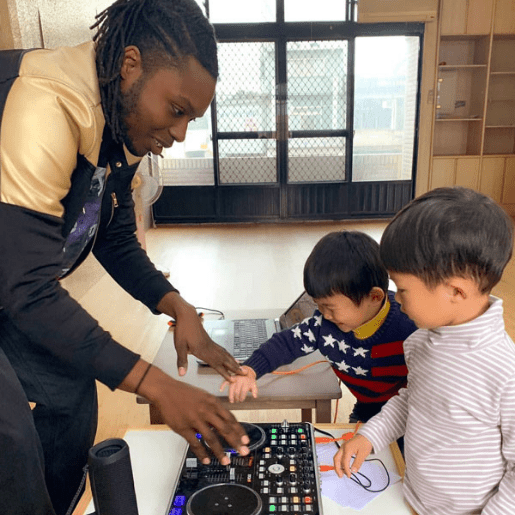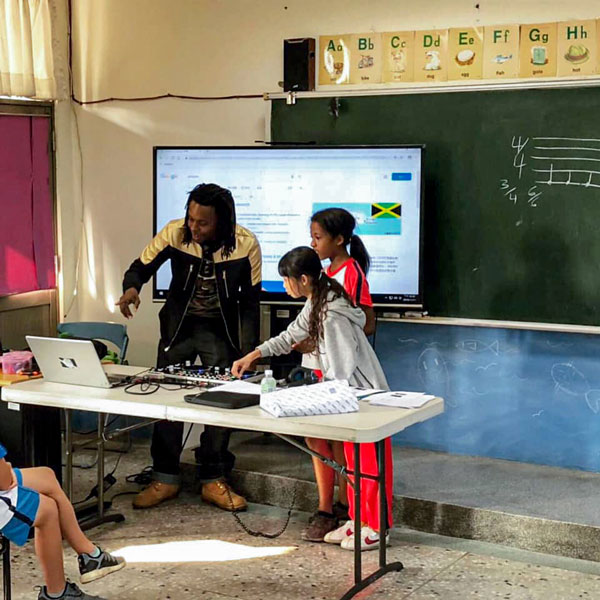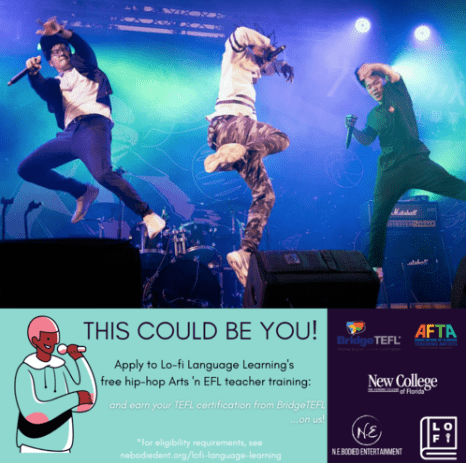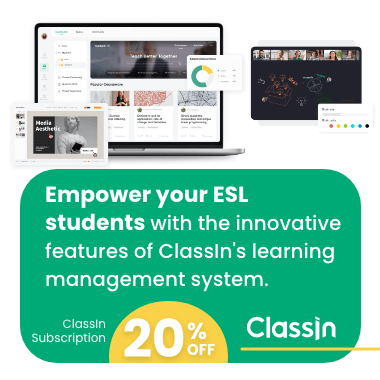In 2019, Miles Iton found himself in a classroom full of Taiwanese sixth graders who were looking on as he put together his entire DJ set-up at the front of the class. The kids were expecting to be taught an English as a Foreign Language (EFL) class by an American Fulbright scholar at Sheng-Li Elementary School in Tainan, Taiwan. That is exactly what they got, but Miles’ approach was anything but the traditional textbook- and grammar exercise-based class these students were used to. This class focused on using hip-hop and rap to teach EFL.
This was not the first time Miles had brought his passion for hip-hop into the classroom. In fact, it was becoming a habit. “I fell in love with hip-hop from an early age – I’d get in trouble at my Christian Kindergarten school for drawing Phat Farm and FUBU logos on my pieces of scrap paper. In a way, it kept me culturally grounded. I was the top of my class throughout my entire K-5 years but was often the only black person in my classrooms and sometimes my entire grade,” he says.
Years later, as an undergraduate at New College of Florida in Sarasota, his love of hip-hop came to the fore again, but this time was embraced. “If you get an advisor to sign off on your study plan or syllabi, you can essentially make your own class. So, I made a freestyle tutorial, which is basically teaching people how to compose and perform and understand rap,” Miles explains. That course, undersigned by Dr. Carl Shaw in the Classics Department, ran for three years at New College and is expected to continue post-COVID via the Lo-Fi Arts ‘n EFL program.
Yet, his academic success at New College was just the beginning. As a multimedia artist whose work includes DJing, producing his own hip-hop albums and making short, independent films and music videos, Miles decided to take his creative skills further. He applied for a Fulbright Scholarship to Taiwan’s National Cheng Kung University, to earn a Master’s in Creative Industries Design.
“I decided for my graduate thesis in Creative Industries Design, I wanted to look at curriculum design and test what it would be like to teach English in Taiwan and then teach my freestyle tutorial from New College fitted to an EFL model and just see what differences we sparked in our four groups of kids that I ran the different classes with,” he says.

Lo-Fi founder, Miles Iton, showing his Taiwanese students how his soundboard works.
He went ahead with this approach, despite going up against some ingrained prejudices about the so-called ‘correct’ way of teaching and the ‘proper’ English that students should be taught. “Native Speakerism is something real in Taiwan. For a non-Western country, they really do have a bit of a Colonial standard in hiring practices, teaching practices, and curriculum practices,” Miles says. “I don’t think Fulbright was entirely the catalyst for this, but part of me wondered, if I didn’t have these cosigns, would I still have been able to come in and do my brand of English?”
Despite these challenges, the in-classroom testing was a success with students engaged and achieving the learning objectives that had been set. This led Miles to found Lo-Fi Language Learning to use his arts-based approach to teach English in Taiwan. However, once COVID-19 hit, he returned to the United States and Lo-Fi’s focus shifted from teaching EFL to students, to training EFL teachers to use hip-hop and rap in the classroom. Thus, the Lo-Fi Arts ‘n TEFL Training Program was born.
Bridge offers TEFL certification for pilot Arts ‘n EFL training program
In late 2020, Lo-Fi reached out to Bridge looking for accredited TEFL certification to complement the Arts ‘n EFL Training program. “We pitched the program to Bridge and they liked the way it sounded,” Miles says. Lo-Fi’s first cohort of trainees in the free-of-charge pilot program is due to begin on February 1st and includes access to Bridge’s 120-hour Master TEFL/TESOL Certification course.
“Being one of the pioneers of online TEFL certification, Bridge is always looking to push the ELT industry forward and find unique approaches and innovative ideas that improve how teachers interact with students.”
Lo-Fi has crafted its program around Bridge’s curriculum and is now putting the final touches on it ahead of accepting students to start at the beginning of February. “At the end of the day, we’re getting more teachers certified in TEFL. They go through Bridge’s program on the schedule we set. Then they tune in to our workshops two times out of the week, which we set up to scaffold Bridge’s curriculum and kind of integrate their existing skills,” Miles explains.
For its part, Bridge was instantly enthusiastic about the Arts ‘n EFL Training program as it was a good fit with the company’s mission to include a wide range of people from around the world, who use diverse varieties of English, into the ELT profession. Bridge believes this variety enriches the profession, making it more representative of the real ways in which English is used in numerous geographical locations and contexts.
“Being one of the pioneers of online TEFL certification, Bridge is always looking to push the ELT industry forward and find unique approaches and innovative ideas that improve how teachers interact with students,” says Bridge’s International Outreach Manager, Andrew Johnson. “The idea of working with artists to engage ESL students by fusing ELT techniques with one of the most popular music genres on the globe was immediately something we wanted to take part in. By ensuring that these teachers are also being trained on how to teach English, we are able to live up to one of our top goals of empowering this global community of English teachers,” he adds.
Lo-Fi’s three-month virtual program trains teachers to use hip-hop in their English language classrooms, and the company’s aim, similar to Bridge, is to change the landscape of classroom English learning, as well as to shake up the hip-hop scene.
“We are looking for artists, educators, and arts-educators from under-represented communities in TEFL, who have a passion for music. Often those outside of the United States of America have a preconceived notion of an American and by extension American English. Our program seeks to disrupt that line of thinking by training participants from diverse and underrepresented backgrounds throughout the United States and the world,” explains Donovan Brown, co-founder and Communications Manager at Lo-Fi Language Learning and an early attendee of the Freestyle Tutorial at New College of Florida.
“Often those outside of the United States of America have a preconceived notion of an American and by extension American English. Our program seeks to disrupt that line of thinking by training participants from diverse and underrepresented backgrounds throughout the United States and the world.”
All of the Lo-Fi Arts n’ EFL program instructors are New College of Florida alumni. The course will be open to community members and students at the college, in an effort to encourage local engagement in the program. “We are currently working on partnerships so that the program participants can do ‘demo classes’ as they are learning, so my hope is to invite in our community partners in this project and develop internship opportunities for some of our graduates to practice their skills in the local community,” says Dr. Stacey Campo, the director of community outreach for New College of Florida.
New College is supporting Lo-Fi’s pilot program with an Andrew W. Mellon Grant. “We are able to use this grant funding due to the community engagement component and also because we see providing high quality, engaging English instruction to be a social justice issue, so we are invested in preparing future English teachers through this project,” says Dr. Campo.
Hip-hop, rap, and community arts bring linguistic and cultural diversity to EFL
The issues related to Native Speakerism and the traditional approach to EFL that Miles Iton encountered in Taiwan are also ingrained in other areas of the TEFL world. The resistance to teaching and learning so-called ‘non-standard’ English is a reality, but hip-hop and rap have also been great drivers in the adoption of the English language and interest in American culture all over the world. Beyond that, hip-hop and rap can also be viewed through a much more academic lens and stand up as high art, considering the artists’ sophisticated use of language, artistic style, and creative flair.

Miles teaching EFL using the mediums of hip-hop and rap.
As Dr. Carl Shaw says in explaining his reason for backing Miles Iton’s Freestyle Tutorial at New College of Florida, “Rap is multitudinous and lends itself to an unbelievable array of topics for discussion and examination,” adding, “There aren’t many academic settings where you can go from analyzing the lyrical cadence of a rapper to discussing social inequalities and then end with a cypher – all in the span of a single class.” He adds that using rap to teach English “Makes so much sense. Rap is a worldwide phenomenon, and although it can be found in countless languages, the culture of rap is still driven primarily by American, English-speaking rappers. Rap opens a compelling door to the English language, and freestyle provides an exciting avenue for students to develop their English skills. Music enhances the language experience significantly, and I suspect that many students learning English as a foreign language are already familiar with the lyrics of at least a few rap songs, which inherently builds confidence and inspires passion to learn.”
Lo-Fi Arts ‘n TEFL program teacher trainer Eileen Calub agrees and believes that teaching EFL through rap and other arts brings benefits to students and teachers alike. “Combining arts and EFL will not only allow educators to share their creative talents with students but also foster the development of creative skills in the language learning classroom. Creativity is an underrated, key skill for any language learner. Exposure to the English language in the context of hip-hop culture will enrich the language learning experience of EFL students and provide an engaging way for learners to connect new grammar points and vocabulary with real life,” she says.
Applications open for the pilot course until January 24th
Places are still available in the program and applications can be made on Lo-Fi’s application page until Sunday, January 24th, 2021. The pilot program is completely free in order to encourage anyone who is interested in using their arts skills in the EFL classroom to take part, regardless of current financial capacity.
“TEFL certification courses are often expensive and pose a financial barrier to those planning to pursue an EFL career. At Lo-Fi, we aspire to make EFL careers accessible to people from underserved communities as well as enrich the EFL field with cultural and ethnic diversity,” says Lo-Fi teacher trainer Eileen Calub.
As Miles Iton describes it, “We’re choosing participants who already have somewhat of an artistic skill that has to do with language. Hip-hop, ideally, but also, storytellers, slam poets, lyricists, MCs – those kinds of featured artists. And from the Bridge side, they get the formal curriculum and through the Lo-Fi side, we mold their arts skills, into arts education.”
Students enrolled in the program will follow a guided curriculum toward completing a 120-hour Master TEFL/TESOL certification course through Bridge TEFL, alongside Lo-Fi’s twice-a-week series of creative curriculum design workshops focused on using artistic skills to teach English. At the end of the program students, leveraging Miles Iton’s filmmaking skills, will produce a final project consisting of a professionally-cut video focusing on their work as artists and TEFL teachers, which will be used to showcase their teaching skills as well as to promote the Lo-Fi Arts ‘n TEFL Program going forward.
“Music enhances the language experience significantly, and I suspect that many students learning English as a foreign language are already familiar with the lyrics of at least a few rap songs, which inherently builds confidence and inspires passion to learn.”
The final projects will also be used as a basis for creating content to be added to the Bridge’s online ELT news magazine, BridgeUniverse, as another way to showcase the newly qualified teacher’s work and encourage more teachers to take up the Lo-Fi Arts ‘n TEFL Training Program in partnership with Bridge.
“At BridgeUniverse, we’re very excited to collaborate with Lo-Fi on new content initiatives and give them a platform to showcase their unique expertise. Using music to teach English is something we believe will be of great interest to our global audience of English teachers, so we’re thrilled to work with Lo-Fi to co-produce this innovative content,” explains Kaitlyn Webster, Media Content Manager at Bridge.
Lo-Fi is also establishing a network to help graduates of the program find work in TEFL. “I think all our participants will be able to find quality teaching jobs in K-12 abroad, and depending on what state they’re in, K-12 here. My ideal scenario, honestly, would be to see a lot of them strike out like we did and take up education entrepreneurship. I personally think a lot of what we see in the young audience of hip-hop creators is a marginalization into one or two industries like music and social media,” Miles says. “So, I would love to see a lot of the more hip-hop oriented participants who already create hip-hop music, strike out and do something different with their rhymes and sell something more than three verses and a hook for what essentially now amounts to pennies.”

Miles is also clear that he believes the Lo-Fi Arts ‘n TEFL program is a fit for young artists wanting to use the skills they have honed over the years in an area that they may not have considered before. “I really want this program to illustrate just how powerful hip-hop and community arts has been to giving people job skills that they can use and carry on into their futures. I’d also just encourage every young kid out there with a SoundCloud account trying to pop off, to think broader, be as creative as you are in your rhymes, and hit us up if you’re looking for an opportunity,” he says.




